Five Fierce Humanists: Unapologetically Black Women Beyond Belief
Introduction by Christopher Cameron
IT IS A WELL-KNOWN FACT that black women have served as the backbone of the black church since its inception. Black women raised funds for church buildings, evangelized for their churches around the world, and constituted the majority of members in denominations such as the African Methodist Episcopal Church. It should come as no surprise, then, that black women have made the modern black freethought movement possible. Among the most significant developments in this movement over the past thirty years has been its institutionalization, and here, as always, black women have played leading roles. Whether it has been the establishment of local groups like the Black Skeptics of Los Angeles, founded by Sikivu Hutchinson, or the creation of national organizations such as Black Nonbelievers, Inc., founded by Mandisa Thomas, African-American women have indelibly stamped their imprint on the freethought movement. They have pushed both black and white freethinkers to broaden their conceptions of humanism and have shown that despite arguments to the contrary, feminism is not only compatible with humanism but is also a central part of what it means to be a humanist. The black women freethinkers featured here, as well as the thousands who aren’t, push us to consider the central role of social justice activism in both our freethought activities and in our daily lives.
Christopher Cameron is an associate professor of history at the University of North Carolina at Charlotte. He received his MA and PhD in American history from the University of North Carolina at Chapel Hill. His first book, To Plead Our Own Cause: African Americans in Massachusetts and the Making of the Antislavery Movement, was published in 2014, and he is currently working on a history of African-American freethinkers from the nineteenth century to the civil rights era.
Candace R. M. Gorham
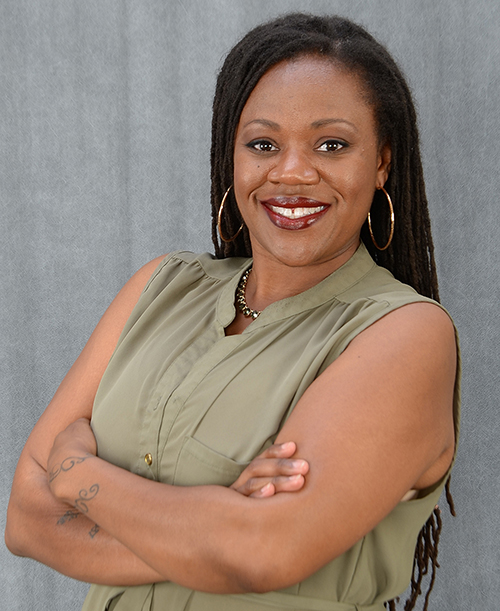 AS A SECULAR BLACK FEMALE, it’s impossible for me not to work toward the betterment of my community. We take care of those around us, Black women; that’s what we do. Once I separated from religion and fully embraced the humanist ideal that people must take care of each other because we’re all we have, the urge to engage in social justice activism became too strong to ignore. It started close to home. I focused on taking care of other Black women. Soon after, I realized how dangerous it is to live in the intersections of racial, religious, and gender minorities. Sure, I knew my community was hurting before, but I always believed there was a god who was going to fix all of humanity’s problems. As an ordained minister, I thought I was obeying a special calling to which I was mandated to put in a certain amount of my own blood, sweat, and tears; but at the end of the day, it was God. It was always on God to get the job done. The problem with removing that god from the equation was that the job still had to be done. The call remained. If not me, who? When God was stripped away, my concern for humanity remained. When there was no Christian-inspired family structure with a male “head” anointed to protect the women, my love for my sistahs intensified. When God’s holy justice disappeared, my heart broke for my disproportionately incarcerated brothas and overly policed Black communities. For the longest time, I never considered myself an activist. As an author, I considered myself merely a researcher providing information to the Black nonbelieving community. One day when a friend said, “You are absolutely an activist,” I resisted. I didn’t like the responsibility that came with the word. But if not me, who? The truth is that I’ve never had the heart of an evangelist; I’ve always had the heart of an activist.
AS A SECULAR BLACK FEMALE, it’s impossible for me not to work toward the betterment of my community. We take care of those around us, Black women; that’s what we do. Once I separated from religion and fully embraced the humanist ideal that people must take care of each other because we’re all we have, the urge to engage in social justice activism became too strong to ignore. It started close to home. I focused on taking care of other Black women. Soon after, I realized how dangerous it is to live in the intersections of racial, religious, and gender minorities. Sure, I knew my community was hurting before, but I always believed there was a god who was going to fix all of humanity’s problems. As an ordained minister, I thought I was obeying a special calling to which I was mandated to put in a certain amount of my own blood, sweat, and tears; but at the end of the day, it was God. It was always on God to get the job done. The problem with removing that god from the equation was that the job still had to be done. The call remained. If not me, who? When God was stripped away, my concern for humanity remained. When there was no Christian-inspired family structure with a male “head” anointed to protect the women, my love for my sistahs intensified. When God’s holy justice disappeared, my heart broke for my disproportionately incarcerated brothas and overly policed Black communities. For the longest time, I never considered myself an activist. As an author, I considered myself merely a researcher providing information to the Black nonbelieving community. One day when a friend said, “You are absolutely an activist,” I resisted. I didn’t like the responsibility that came with the word. But if not me, who? The truth is that I’ve never had the heart of an evangelist; I’ve always had the heart of an activist.
Candace R.M. Gorham is a licensed professional counselor with a background in middle and high school education. A former evangelical minister, she founded the Ebony Exodus Project to explore the reasons record numbers of black women were leaving the church and in 2013 published The Ebony Exodus Project: Why Some Black Women Are Walking Out on Religion and Others Should Too. She is on the advisory council of the Black Humanist Alliance of the American Humanist Association and is a member of the Secular Therapist Project and the Clergy Project. She currently lives in Durham, North Carolina, with her fourteen-year-old daughter.
Sikivu Hutchinson
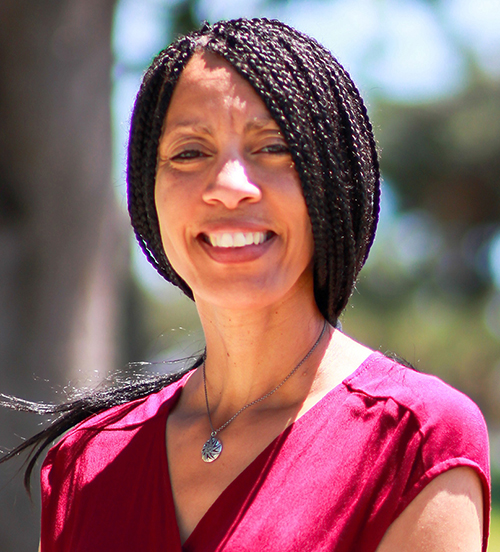 RECENTLY, MY STUDENTS led a series of sexual violence and sexual harassment peer education trainings at their predominantly African-American and Latinx South Los Angeles high schools. Working with youth from all genders and sexualities, they broke down the complexities of rape culture, sexual violence, victim blaming, and “toxic masculinity” from their intersectional lived experiences. While the #MeToo movement has brought widespread media focus on high profile white women in the entertainment industry, it is estimated that a majority of Black girls experience sexual abuse by age eighteen.
RECENTLY, MY STUDENTS led a series of sexual violence and sexual harassment peer education trainings at their predominantly African-American and Latinx South Los Angeles high schools. Working with youth from all genders and sexualities, they broke down the complexities of rape culture, sexual violence, victim blaming, and “toxic masculinity” from their intersectional lived experiences. While the #MeToo movement has brought widespread media focus on high profile white women in the entertainment industry, it is estimated that a majority of Black girls experience sexual abuse by age eighteen.
For over a decade, my work has centered on culturally responsive teaching, program development, mentoring, youth leadership training, and college readiness for first-generation Black girls and youth of color impacted by the school-to-prison and sexual abuse-to-prison pipelines. Leading this work on a daily basis in communities of color that are often erased from mainstream public policy and discourse on sexual violence is at the core of my commitment to humanist critical consciousness and social justice. My humanist activism is inseparable from my identity as a Black feminist, atheist, writer, educator, sexual violence survivor, and union shop steward living in and around segregated African-American neighborhoods routinely demonized as “dangerous” and “other.” Yet, when the dominant culture thinks about humanism and secular values, it is traditionally through a white, Eurocentric lens removed from the progressive anti-capitalist, anti-racist, feminist struggle.
For example, our community work on sexual violence education draws from a long tradition of Black feminist human rights resistance that shaped the modern civil rights movement. Black women have long connected the sexual terrorism they experienced working in private homes and public spaces with the fight for economic justice and self-determination. Drawing from this legacy, it’s always been important for progressive Black atheists to insist that the humanist struggle is not just rooted in pushing back against religious dogma, bolstering church-state separation and science, and resisting patriarchy, but in dismantling white supremacy, American-style apartheid, and wealth inequality. It’s a humanist crisis when only white youth have the right to go to schools free of policing, to gain equitable access to college opportunities, or grow up in communities where they can expect to live into adulthood.
Sikivu Hutchinson is the founder of the Women’s Leadership Project, a Black feminist mentoring and civic engagement program for girls of color in South Los Angeles high schools. She is also the founder of Black Skeptics Los Angeles and the author of Moral Combat: Black Atheists, Gender Politics, and the Values Wars and the new play, NARCOLEPSY, INC., which will debut at the 2018 Hollywood Fringe Festival.
Liz Ross
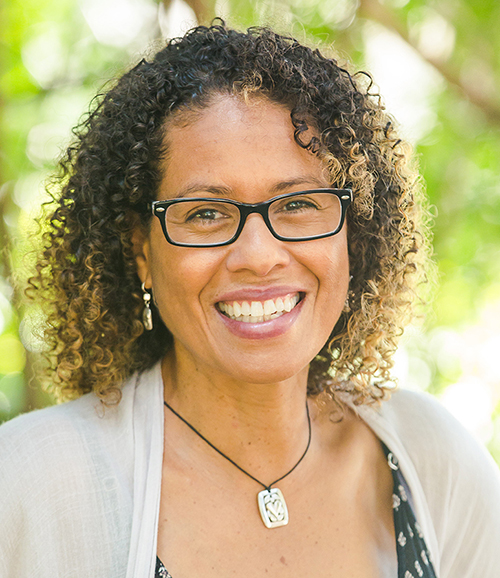 I CAME TO IDENTIFY as an atheist after exploring the question of why there is so much senseless suffering, and recognizing ways in which white supremacy, patriarchy, and anti-LGBTQ sentiment is embedded in religious doctrine and in our culture. The experience also played a pivotal role in liberating my mind from negative self-reflection. The god that I was brought up to worship was not a reflection of myself. Nor did the tenets of his followers’ holy book, and the society in which I was raised, offer me support to fully recognize my dignity as Black, female, and not heterosexual.
I CAME TO IDENTIFY as an atheist after exploring the question of why there is so much senseless suffering, and recognizing ways in which white supremacy, patriarchy, and anti-LGBTQ sentiment is embedded in religious doctrine and in our culture. The experience also played a pivotal role in liberating my mind from negative self-reflection. The god that I was brought up to worship was not a reflection of myself. Nor did the tenets of his followers’ holy book, and the society in which I was raised, offer me support to fully recognize my dignity as Black, female, and not heterosexual.
Secular humanist thinking, in my view, includes critical thinking, knowledge, compassion, and empathy. Mapping connections between the systems that create inequities in the world reinforces in me the need to be involved in creating social change. My agency did not come from a higher power, but from within. My motivation to constantly process ideas, look for solutions, and engage in dialogue with others comes from a desire for fairness and justice—a desire that does not require belief in an invisible entity.
I have been involved in social justice issues for over twenty years. Since 2012 I have been an active member of Black Skeptics Los Angeles. BSLA promotes social justice work through a secular humanist perspective.
Recently my focus has included both human and animal rights in our food system and working towards creating sustainable food systems. Our current food system implements policies and practices that work to maintain political and corporate power. Those most negatively affected, locally and globally, are Black and Brown people. In addition, this violent food system creates another group of victims we rarely discuss, namely the nonhuman animals we exploit. Living consistently with my values means working toward creating fair food systems that challenge a speciesist mindset that perpetuates domination, control, and violence toward animals who suffer like us. The root of that mentality is the same for any other system of injustice.
Food sovereignty and food security is complex because it includes focusing on anti-racism, anti-xenophobia, the rights of workers and farmers, nonviolence against women, animal rights, health, environmental sustainability, and fair economic systems. Hence, there are no simple solutions.
Liz Ross is cofounder of the Vegan Advocacy Initiative, an animal advocacy and food justice nonprofit organization. She is also an active member of Black Skeptics Los Angeles.
Bridgett Crutchfield
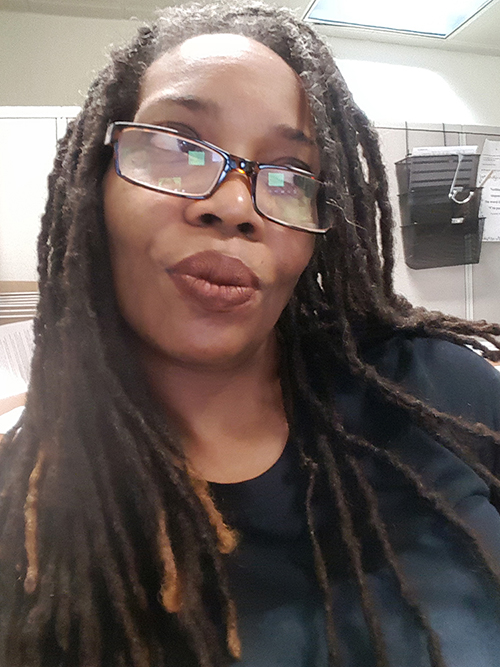 BEING BLACK, FEMALE, lesbian, atheist, humanist, “non-rich,” and middle aged—just to name a few identifiers—COMPELS me to be vocal. And my being vocal typically entails utilizing salty, “unladylike” language, much to the chagrin of those who attempt to subjugate me into their patriarchal boxes.
BEING BLACK, FEMALE, lesbian, atheist, humanist, “non-rich,” and middle aged—just to name a few identifiers—COMPELS me to be vocal. And my being vocal typically entails utilizing salty, “unladylike” language, much to the chagrin of those who attempt to subjugate me into their patriarchal boxes.
To hell with them.
My mother says I was a “humble child” until I became a teenager, but in the same breath will relay anecdotes of my boldness early on. I’m told I even took my kindergarten teacher to task. It’s possible.
I do recall vividly a white woman “cutting the line” in front of my mother as we waited to register our names at the doctor’s office. My mother didn’t say anything, but I promptly advised the stranger of her intentional mishap. I went on to tell her she was wrong, and based on my teachings at school, she was outright disrespectful. I’ll never forget how quiet the office was. She eyeballed me, and I eyeballed her back as she shuffled her ass to the end of the line. I felt my mother’s gaze upon me.
I was approximately nine years old and had no thought, concept, or knowledge of race relations or their implications, but I was sensitive to the fact that someone overstepped their damn bounds with my MOTHER. Absolutely not on my watch.
That overprotectiveness and boldness are old and familiar friends to this day. I’m also familiar with disappointment. The disappointment felt at the age of nine when that brazen woman stepped before my mother is the same disappointment that permeates my being as I observe organized humanists being selectively humanistic.
Being empathetic, giving a damn, hurts. I care about the people in the communities I belong to. Walking away, as inviting as that sounds, isn’t an option. I won’t give up, but I’m at ease knowing my voice is one of many—a harmonious choir that sings songs of spirit, war, equality, and justice—raising one fist as the other wraps around a plow.
We fight because it’s who we are. We remain steadfast because we’re compelled to.
Bridgett Crutchfield was baptized and raised in the Jehovah’s Witness faith, from which she was later disfellowshipped. In 2006 she came out as an atheist, in 2011 she founded Minority Atheists of Michigan, and in 2013 she established the Detroit affiliate of Black Nonbelievers. She says she has a mouth as big as her heart, hates respectability politics, and will boldly tell you to kiss her where the sun doesn’t shine.
Mandisa Thomas
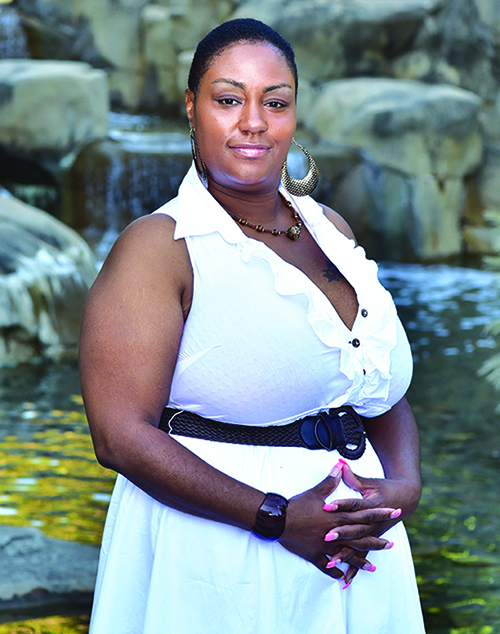 SOCIAL JUSTICE has been defined as a concept of fair and just relations between individuals and society. This means fighting for those who are either misrepresented, marginalized, or both.
SOCIAL JUSTICE has been defined as a concept of fair and just relations between individuals and society. This means fighting for those who are either misrepresented, marginalized, or both.
My work with Black Nonbelievers includes providing support for and increasing the visibility of black atheists, which incorporates social justice. We are building community, creating connections, and helping others, which incorporates humanism. Our leadership is comprised mostly of women, and our existence has amplified the voices of more women who have broken free from religious beliefs, which incorporates feminism. And our mission and values include the LGBTQ community, a community represented in our leadership and membership, which incorporates intersectionality.
Creating a foundation where people can come to terms with their atheism/nonbelief within a community that has already suffered from marginalization has been monumental. It isn’t perfect, and we can’t save everyone, but our goal isn’t to save. It’s to show that we as a people have more power than we realize, and that we are empowered to grow beyond what we’ve been taught. It’s up to us to save and help OURSELVES. And we can be bold with our atheist identities in the process.
Mandisa Thomas is the founder and president of Black Nonbelievers, Inc. She has been featured on CBS Sunday Morning, NPR, and other major media outlets regarding atheism in the black community.
